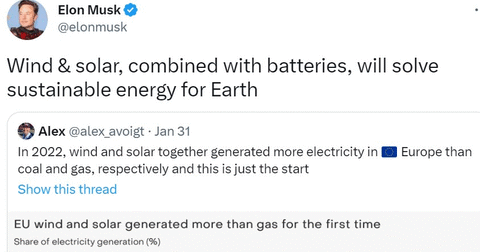Elon Musk, Ram admit: With green energy, there’s always a catch
Nuclear energy is needed to make wind and solar go, Musk says, while internal combustion engines provide the “range extender” for a Ram EV truck
“Wind & solar, combined with batteries, will solve sustainable energy for Earth,” Elon Musk tweeted on Jan. 31.
He quickly added an asterisk in a second tweet: “Hydro, nuclear fission & geothermal will also be significant parts of the solution.”
So, wind and solar are the future, when you add in stuff that works reliably, like nuclear energy. Got it.
Ram found itself in the same predicament this week, when it rolled out a Ram EV truck with the mother of all asterisks: A “range extender” in the form of a gas engine,” as reported by Car and Driver.
That’s right. To make sure its EV truck works and can get people to point B, the Ram EV truck won’t have a bigger or better EV battery. It will rely on the technology that’s been known reliable for a century, the internal combustion engine.
Jason Hayes, director of environmental policy at the Mackinac Center, sees in Musk’s tweet and the Ram’s range extender an admission: Green energy, on its own, is not reliable.
Hayes argues energy reliability in Michigan is being dismantled by a premature transition to technologies, such as wind and solar, that are not ready to take over from coal, natural gas and nuclear.
“We are moving away from the notion that we can use technology to provide continuous reliable electricity to the notion that the planet requires us to stop using unless the planet has decided to produce electricity via wind or the sun,” Hayes told CapCon. “Our lives will change markedly.”
Hayes warned of this scenario in a June 2021 blog post, “While Michigan’s Electricity Rates Increase, Reliability Suffers.”
As Hayes wrote then:
It is essential for Michigan residents to realize that their ability to choose is being restricted as utilities build an electrical system that now operates on much thinner margins than in the past. Utilities are closing large, reliable, fossil fuel and nuclear plants and attempting to replace them with reliably unreliable wind and solar.
But intermittency and unreliability are unavoidable artifacts of a system designed around energy sources powered by the often unexpected caprice of weather.
Two years later, DTE Energy is moving to a peak-hour pricing system whose energy costs will rival California’s during the summer months.
- Related reading: DTE’s peak-hour rates in Michigan are on the cusp of California’s
Michigan Capitol Confidential is the news source produced by the Mackinac Center for Public Policy. Michigan Capitol Confidential reports with a free-market news perspective.



 Carrollton teacher hopes that Michigan lawmaker ‘chokes on a bag of [expletive] and dies’
Carrollton teacher hopes that Michigan lawmaker ‘chokes on a bag of [expletive] and dies’
 EVs force technology on drivers
EVs force technology on drivers
 Whitmer boasts of Michigan’s energy prices, which are high for its region
Whitmer boasts of Michigan’s energy prices, which are high for its region